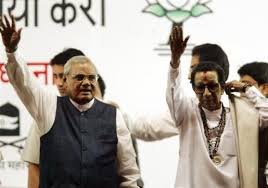Political Career
Atal Bihari Vajpayee

Political Career
He became associated with the Bharatiya Jana Sangh (BJS), a right wing political party founded by Syama Prasad Mookerjee in 1951. He became a loyal follower of Mookerjee and supported him during his fast unto death in Kashmir in 1954.Vajpayee was elected to the Lok Sabha for the first time from Balrampur (U.P.) in 1957. He proved himself to be an excellent orator and gave powerful speeches.He was made the national president of the Jana Sangh in 1968 after the death of Deendayal Upadhyaya. Over the next few years he worked tirelessly with Nanaji Deshmukh, Balraj Madhok and Lal Krishna Advani to make the Jana Sangh a prominent presence in Indian politics.In 1977, the BJS was united with the Bharatiya Lok Dal and the Socialist Party to form the Janata Party. After the victory of the Janata Party in the general elections, Vajpayee became the Minister of External Affairs in Prime Minister Morarji Desais government.The Janata Party was dissolved following Morarji Desais resignation as Prime Minister in 1979. Vajpayee, in collaboration with Lal Krishna Advani and Bhairon Singh Shekhawat formed the Bharatiya Janata Party (BJP) in 1980 and became the partys first president.
After the 1984 elections, when BJP was reduced to two seats, Vajpayee worked tirelessly to build the party and in the next parliamentary elections in 1989 BJP won 88 seats.By 1991, BJP had emerged as the principal opposition party and the party won 120 seats in 1991 parliamentary elections.He became the Leader of the Opposition in Parliament in 1993 and in November 1995 at a BJP conference in Mumbai, he was declared as the Prime Ministerial candidate of BJP.
 Childhood Early Life
Childhood Early Life 2002 Gujarat violence
2002 Gujarat violence 2001 attack on Parliament
2001 attack on Parliament Indian Airlines hijack
Indian Airlines hijack Education
Education Personal life and interests
Personal life and interests Major Works
Major Works Professional Life of Atal Bihari Vajpayee
Professional Life of Atal Bihari Vajpayee
 Bharatiya Janata Party
Bharatiya Janata Party As prime minister of India
As prime minister of India Kargil War
Kargil War Biography
Biography Test your English Language
Test your English Language  Valentines Day Games
Valentines Day Games Makeover Tips For Hair
Makeover Tips For Hair Know Tie Knots
Know Tie Knots What to Eat in Delhi
What to Eat in Delhi The Most Romantic Train Journeys
The Most Romantic Train Journeys




